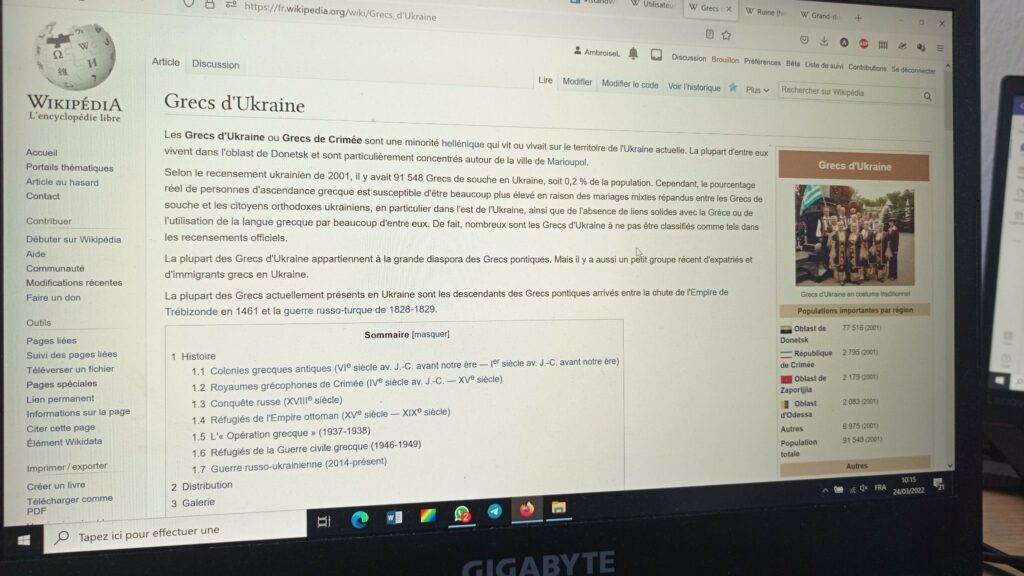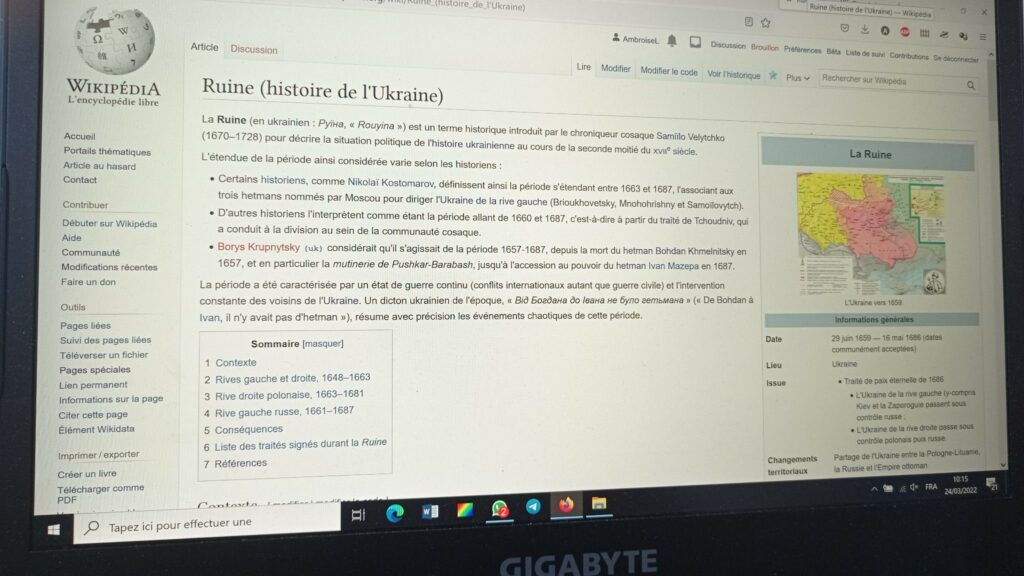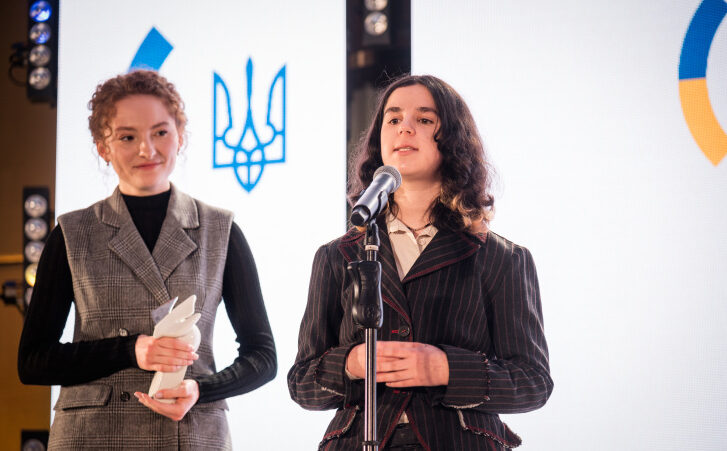
#IStandWithUkraine: The story of Ambroise
Ambroise Lescop is a graduate with two Master’s degrees in political sciences and international relations. Since secondary school, he was following a binational curriculum, obtaining a German and a French baccalaureate. He then studied at the Universities of Bordeaux (France) and Stuttgart (Germany). Passionate about languages, he attended different language classes. His other interests include history, geography, and international relations. Because of his family roots, Ambroise is particularly interested in the politics, culture, and history of Central and Eastern Europe. Ambroise is now planning to write a PhD thesis.
Hello Ambroise! Thanks for accepting our invitation. We know that, since the invasion of Ukraine started on 24 February, you have been active in disseminating correct information. Could you tell us a bit more?
Hi, and thank you for inviting me! Yes, exactly. As the war started, so started an intense activity on Wikipedia. A lot of new articles appeared about the war, the battles, the sanctions, that were very low standard and also reflected the battlefields of contradictory interests and narratives. Typically, people would learn via a tweet or an Instagram post about a battle being fought in Ukraine, create a poorly-written stub article without any reference stating that the Ukrainian army had won the said battle, and a few minutes later another anonymous user would appear and delete any mention about Russian casualties and transform the status of the battle from “Ukrainian victory” to something like “outcome unclear”. The main article about the war was also under continuous attack, with a lot of anonymous users adding or deleting unsourced info at will.
In the beginning, I was mostly active on the articles dealing with current events: I would for example try to keep the main article clean and readable, to add sources when possible, and to enhance the articles about individual battles with reliable and up-to-date information, so that French speakers could have a reliable and updated source of information about the war. This was the most difficult part because those “small” articles aren’t reviewed as much as the main article, and thus they are the easiest target for trolls or Putin-fans.
Wow! I imagine this has been not easy. What were the biggest challenges that you encountered?
I think that it was the sheer number of changes made to the articles, especially the main one. It was almost impossible to keep track of everything that was being modified, and even the moderation team was lost. I remember having several of my changes reverted because I posted them at the same time as a moderator was trying to cancel something a troll had written a minute before. Actually, the trolls aren’t the main problem on Wikipedia, because since they’re not registered as a verified user, every single change they make to the article is marked with a large red exclamation mark in the article changelog, so it is fairly easy to catch them. The main difficulty are the registered members who somehow pursue an agenda and always slyly add or remove information without discussing it with the team. Since they are registered contributors, it is not that easy to notice. When this happens, what we usually do is to discuss it on the Wikipedia forum: most of the time, we end up reaching a consensus.
After a few days, the main article about the war in Ukraine had been put under protection: only registered users could change it. It meant far fewer troll attacks, so I had less to do. I decided to move on to other topics: for example, as the Russian army killed ten members of the Greek community of Mariupol, provoking a diplomatic crisis between Russia and Greece, I noticed that there was no article on the French-speaking Wikipedia about the Greek minority in Ukraine, so I created it. I think that a lot of people discovered with that event that there was actually a Greek minority in Ukraine, so the article was very timely. It is still my article with the biggest readership, with 82 unique visitors every day.
After that, I decided to step aside from the current events for a bit. I started creating or translating articles about the history of Ukraine because I think it is very important to inform people about it. For example, Ukraine had a unique form of government during the 16th and 17th centuries: it was more or less an autonomous Cossack republic, that existed under the suzerainty of the king of Poland. In the mid-17th century, the Cossacks rebelled and after some years of war, they signed a treaty with the Poles to make Ukraine an independent Duchy under the King of Poland. The project eventually failed, but this shows that Ukraine was already seen as a distinct nation at that time and could have become an established state — very far away from the Russian propaganda and the idea Putin pushes forward that Ukraine had never had any autonomy and had always been part of Russia. But that knowledge wasn’t available to French readers! So that’s why I think it is also very important to have Wikipedia articles about the older history of Ukraine so that people can understand that Ukraine isn’t an ahistorical country that somehow appeared out of the blue in 1991.
How do you think young people could support Ukraine in the information field? How important is that?
I think that the information field is a key point in the current war. Information has always been very important, and propaganda exists since ancient times, but nowadays more than ever it is very difficult to find reliable sources of information. Moreover, Putin’s rhetoric is tainted with historical references, and a lot of background knowledge is needed to understand how he thinks and when he lies — background knowledge that the media doesn’t always take the time to remind the readers of. And finally, Putin is trying to revise the history of Ukraine — so broadcasting it is a way of fighting him.
I think that adding information on Wikipedia is very important because a lot of people have the reflex to use it for fact-checking: the information is becoming more and more reliable, and as opposed to the online newspaper, you don’t have to fight your way between cookie use agreements and disruptive advertising before reaching the actual content. Also, Wikipedia keeps track of every single change that has been made to the article, so it’s easier to spot disinformation than on other media. Writing on Wikipedia also ensures a broader readership than personal blog posts or tweets, and can be done by each volunteer in their native language. For me, it’s an easy but efficient way for young people to disseminate information, especially when writing on “small” Wikipedias that don’t have a lot of writers and thus lack a lot of basic information. But anyway, to disseminate information is good: Putin wants to censor the history of Ukraine; let us prevent that from happening.


LATEST

Building Europe: Poland’s experience of joining the European Union and lessons for Ukraine

World Health Day 2024: My Health, My Right

EUREKA MEETS EUROPE – opportunities to develop and study. My experience

Can you wear pink in the workplace?

Go where your deepest fears lie: finding the courage to overcome gender barriers in STEM
More campaign pages:
Interested in the latest news and opportunities?
This website is managed by the EU-funded Regional Communication Programme for the Eastern Neighbourhood ('EU NEIGHBOURS east’), which complements and supports the communication of the Delegations of the European Union in the Eastern partner countries, and works under the guidance of the European Commission’s Directorate-General for Neighbourhood Policy and Enlargement Negotiations, and the European External Action Service. EU NEIGHBOURS east is implemented by a GOPA PACE-led consortium. It is part of the larger Neighbourhood Communication Programme (2020-2024) for the EU's Eastern and Southern Neighbourhood, which also includes 'EU NEIGHBOURS south’ project that runs the EU Neighbours portal.

The information on this site is subject to a Disclaimer and Protection of personal data. © European Union,